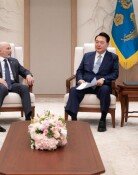Stop being `bossy` to be a genuine parliament member
Stop being `bossy` to be a genuine parliament member
Posted September. 02, 2015 06:59,
The 19th regular session of the National Assembly just started and will go on for 100 days. However, already at the first main session, the 2014 settlement bill and the motion for the appointment of Supreme Court justice candidate Lee Ki-taek, which should have been handled in August in parliament, remains pending due to differing opinions between the leading and opposition parties over the screening of special activities cost. The opposition parties say they will continuously raise the special activities cost issue, potentially prompting more crashes going ahead even as the regular session schedule has yet to be finalized.
As some politicians argue, if the main opposition New Politics Alliance for Democracy is raising this special activity cost issue in order to hurt the National Intelligence Service, prosecutors, the Justice Ministry and the Supreme Court, this is no more than a bossy act. If special activity cost reform is so important, it will be proper to look in to the National Assemblys role rather than picking on government agencies that are protected by law not to release information of confidentiality.
The National Assembly uses 8 billion won (6.8 million U.S. dollars) worth of special activity costs, which is 1 percent of the nations total special activity costs of 880 billion won (748 million dollars) in terms of next year`s budget. The money is given to those in charge of parliament operation including assembly members, floor leaders of main and opposition parties, committee chairmen and special committee chairmen. Each is given 6 million won (5100 dollars) to 50 million won (42,517 dollars) every month. Nevertheless, in some cases the money is spent in large part for personal reasons. It has been revealed upon investigation that South Gyeongsang Governor Hong Jun-pyo and New Politics Alliance for Democracy Rep. Shin Gye-ryun used them for living expenses and for their childrens overseas study.
The purpose of parliamentary inspection of government offices is to supervise administration and budget execution of the government and public agencies. However, this has turned into a parliament members means to yield power, which needs dire reform. The opposition party has declared audit on chaebol, with the Trade, Industry and Energy Committee alone examining summoning 150 businessmen as witness or testifier. They are scaring businessmen as being picked as witness as a means to solve private civil affairs issues. Large companies are lobbying parliament members to prevent their chairmen from being called upon, and even have executives exclusively in charge of lobbying.
Parliament members held a declaration ceremony Tuesday, saying, We will live like a parliament person. This is ridiculous. They pledged to walk in each others shoes and make efforts not to be criticized that main and opposition parties are fighting all the time.
The basis of living like a parliament person is to precede private obligations by public affairs New Politics Alliance for Democracy leader Moon Jae-in said. I will put down vested rights and think for the people, which received applause. If parliament members want to live up to such expectations they should first put down acting bossy.







